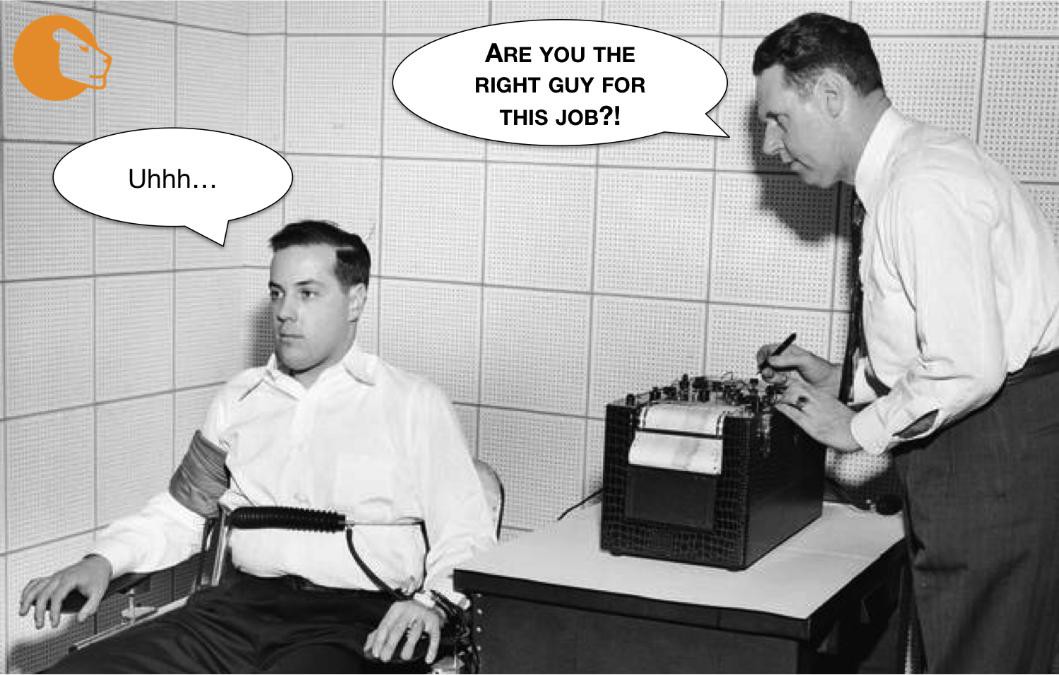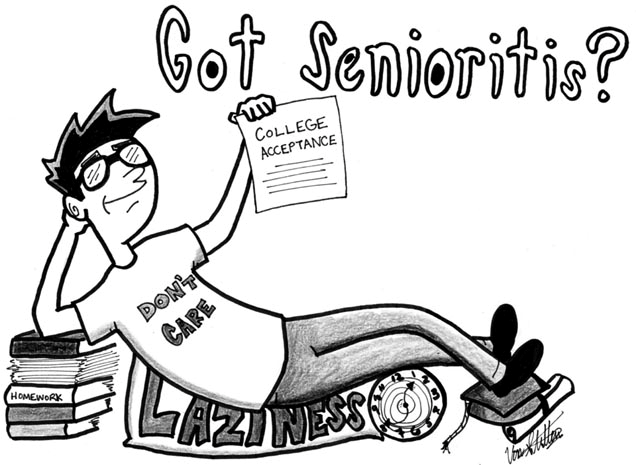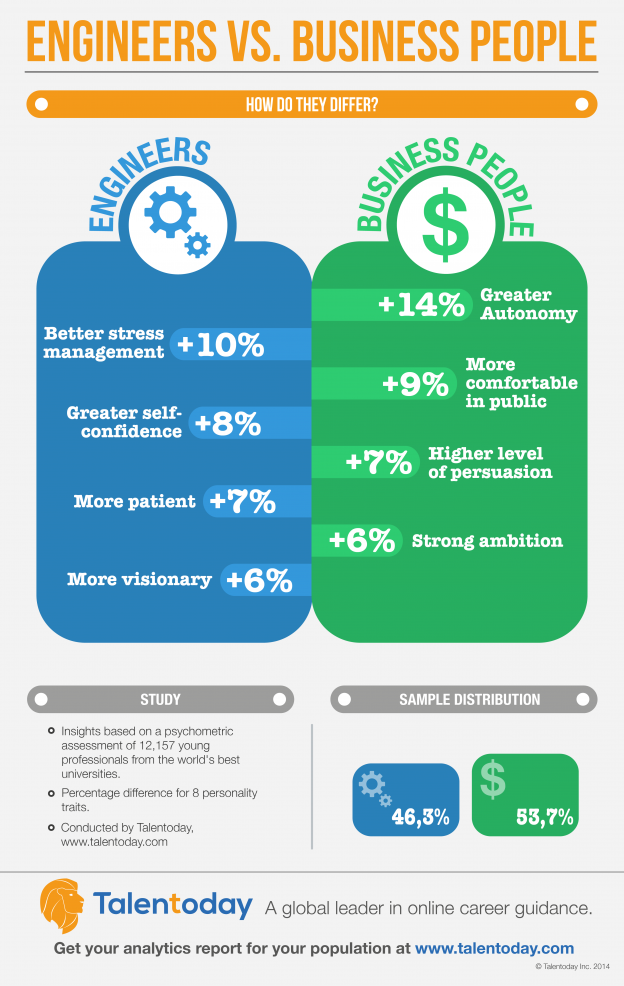What’s your management style? Infographic with women vs. men comparison
One day we may all be promoted to a management position. Experience and career advancement push us towards positions with more responsibilities, so what kind of managers will we be? Depending on our personalities, we will adopt different types of attitudes and behaviors.
A leader’s personality varies widely. In fact, there are as many different ways to manage people as there are people on earth. Management style is the result of the manager’s environment as well as his or her true character. In order to be most effective, the style must be adapted to each situation*. Adopting the same behavior for each situation could be a real problem for people leading teams and projects.
Paul Hersey and Kenneth Blanchard proposed a typology of 4 main management styles. To understand the different types, we need to take various factors into account, such as the natural tendency to lead of the people, or the manager’s ability to open up to other people’s ideas.
Let’s take a look at the four types introduced by Hersey and Blanchard, and how they can exist in the workplace:
- Autocratic Management: The manager makes decisions within the team, acting as an example for others. Especially in times of stress, employees may enjoy working with an autocratic leader. They may enjoy being told exactly what to do and having someone step up, take initiative, and take control of the situation. This management style can be especially effective when decisions are needed on an urgent basis, but can be somewhat stressful for some employees when the added pressure plays against them, hindering their performance and the overall atmosphere in the workplace.
- Paternalistic Management: The manager devotes time to pedagogy, taking the time to explain decisions and coach the team. In this style of management, the relationship between leaders and their employees is similar to the relationship between the head of a family and the members of the family. The manager in this sense is guiding and protecting his employees as if they are members of his own family. This approach can be difficult when used with senior professionals, who may not like their own interests looked after so attentively. Instead of gratitude, it may bring about resentment among senior-level employees, so may be a more successful style for use with entry-level employees who are in need of a more hands-on approach. The relationships between these coworkers and their leader are extremely solid.
Democratic Management: The manager encourages the participation of the team and includes their point of view in the final decision. This style is a very open way of organizing a team. Ideas are encouraged, and are openly discussed within the group. Everyone is encouraged to share their point of view. With situations of frequent change, this form of management allows for a great deal of flexibility in order to adapt and improve. Democratic management may bring out the best in a highly-experienced team, capitalizing on their skills, talents and experience, allowing them to share their views, rather than expecting employees to conform to one idea. This style may be inefficient in times of emergency or rush, as the decision-making process is longer. - Delegative Management: The manager leaves decisions up to the team, empowering others to develop and grow their ideas. This style is also known as laissez-faire or hands-off, as it empowers employees to strengthen their own management and personal leadership skills during the process. The leader assigns tasks to employees, while providing adequate support and resources to complete them, and the employees are responsible for each of their own projects. While the manager is still held responsible for the final product, this style expresses trust in employees, and allows the manager to be available to employees for feedback and growth. When the team needs too much reassurance or encouragement, the style might not be adapted, especially during stressful situations or with entry-level employees.
So, what’s your management style?
With data collected through Talentoday’s analytical tools, we developed the following infographic illustrating the preferred management styles of men and women around the world.
*The Situational Leadership Theory, Paul Hersey and Kenneth Blanchard (1967)
Learn more about Talentoday and take the scientifically designed assessment:www.talentoday.com
3 things you must do before hiring candidates

Every manager, HR professional and recruiter faces the same question: Am I recruiting the right candidate for this position? It became essential to be able to discover and acknowledge the value of your future employees and the way they will match to the job position in our fast-paced and technology driven world. Performance is directly correlated to the fit between your candidate’s skills, personality and motivation but also to your company culture, requirements for the job, team members already in place, etc.
Here are the 3 things you need to do:
1 — Evaluate their skills
You want to explore the knowledge and cognizance of every individual, or what the person knows how to do. The skills and aptitudes of a person are usually identified in resumes, diplomas, and experiences. These can also be distinguished via aptitude tests, performance tests, real-life simulations or exercises. Before the meeting, it’s essential to take note of the exact tasks, responsibilities and tools the future employee will have to do, use or learn.
2 — Explore their personalities
This point is crucial and it is the center of the assessment process, in meetings between a recruiter and a candidate. It is not groundbreaking to acknowledge that there is a strong correlation between personality fit and performance in a career. Personality is a complex concept that can be explored in many complementary ways.
We can evaluate it by using personality tests, and with previous employers recommendations, 360-degree feedback or in a well-conducted face-to-face semi-directive interview. The main advantage of using personality tests for interviews (when they are serious!) is that they allow for the standardization and normalization of assessments between different people. Nowadays most are online, easy-to-use and inexpensive. In a way, they allow you to know your candidates before you meet them.
3 — Understand their motivations
Motivation is the third fundamental element to consider while assessing individuals you wish to recruit. It is so important to be aware of people’s aspirations, to know what they seek in their professional lives, and what motivates them. Candidates must select the organization that interests them, identify the people for whom and with which they work, and enjoy the possibilities offered. Every career opportunity must also fit the career plan of the applicant. For example, you can hire the best talent to work for Salesforce.com, but if he is not motivated by the tasks, he will not perform his best, and will leave the company earlier than expected.
If you wish to hire applicants who fit the open position and company culture, make sure you take these points into consideration. While you are free to select a candidate, applicants also choose the company and the people they will work for, their preferred position, and the working framework that matches their expectations.
Adopt the best practices for recruitment and download our free 20 page guide on assessing and selecting talents.
Feel Prepared Your Senior Year
It’s your senior year and you’re really not looking forward to going back to school. We know about having “senioritis.” We really understand it too! For this reason, we want to help with your transition from senior year to a new school. The Talentoday Team has come up with three tips to help you have a positive outlook towards filing applications to different colleges, looking for housing, and meeting new friends or classmates for the coming year.

Tip #1: Applying to colleges
Take a look at your strong points on your personality and motivations radar. Are you someone who is at ease in public? Or do you tend to be an independent and autonomous person? Research schools and programs where your personality and motivations will be satisfied and fulfilled. This way you’ll feel more confident applying to the programs at different schools. You shouldn’t have to drastically tailor yourself to programs; you should feel like you belong where you apply!
Tip #2: Looking for housing
For many of us, tuition fees are extremely high and cannot afford to live on our own. Because of this, we have to look for roommates. Compare your personality and motivations radar with potential roommates via your Talentoday profiles. Do you prefer to have an organized roommate? Or do you want to be roommates with someone who has similar motivations as you? Want to get to know your potential roommate at a more personal level? These types of questions can be answered by simply connecting and sharing profiles. You might just save yourself from a stressful quarter or semester with a roommate you do not get along with.
Tip #3: A-team for group projects
Attending a new school means you’ll meet new people. You may meet some who are studying the same thing as you or are part of other programs that your school offers. Either way, if you are assigned a group project, you will be interested in who you can count on for the completion of these. Who will be the leader, or the event organizer? Who can keep up with stressful situations and meet deadlines? By sharing your personality and motivations results with friends and classmates, you will be able to distinguish each person’s character and might be able to form a grade A-team.
Your personality and motivations radars reveal the real you. After you recognize your talents and motivations, you will feel more confident applying to the programs at different schools, as well as seek roommates and group mates that complement your qualities. So, put senioritis off to the side and take control over your skills and incentives. Invite your friends and classmates to take the Talentoday questionnaire, and compare your results with everyone to identify those whom you can successfully work with in the personal, academic and professional world.
Simply hire quality employees

Have I hired the right person? This is a common question asked by human resources professionals and managers around the world.
In many companies, human resources managers, career coaches, and recruiters are faced with a large number of job applications each year, many of which don’t even get looked at. Let’s be honest, only the first couple of applications get reviewed and the rest come from references or connections you have. You trust your connections and you will hire those referred to you because this makes your job that much easier.
But still, how do you know you’ve hired the right person? You could literally sit and read all of the applications and resumes sitting on your desk. We don’t doubt your ability to do this day in and day out. However, we know a way that you can zip through applications, and feel more confident in narrowing your choices to the right candidates for an interview.
Talentoday offers innovative and modern cloud solutions to professionals like yourself that allow you to view and interpret the personalities and motivations of each applicant (with their consent, of course).
Talentoday differs from the Myers Briggs in that it allows you to explore precise personality traits and enables you to reach and serve more individuals by satisfying their needs. Between the career coach and the potential employee, there exists a sense of openness, communication and accountability or transparency that is not found within other tests because results can be immediately shared and interpreted. Not only do you benefit from this experience, but your population does too! In other websites where questionnaires are offered, people don’t have direct access to their own results and, in fact, sometimes never even get to see them. Talentoday, on the other hand, offers everyone a personalized, user-centric experience that facilitates potential employees to seek the right position for themselves, which lowers the number of applications you must go through to select the perfect candidate. It’s a “win-win” situation if you ask us…
Talentoday has also broken from traditional pay-pertest models and allows career coaches or career counselors to administer unlimited questionnaires via the Talentoday online platform. Our cloud solution provides the speed, flexibility and security that every human resources manager and recruiter needs. To help you guide every individual in the right direction, our Talentoday Manager gives you access to the fundamental tools and empowers you to be better at what you do.
With Talentoday Manager, more HR Managers and professionals aren’t just reviewing the first couple of applications, but are getting to know each candidate at a more personal level, and are identifying the qualities or talents that naturally fit the role in less time.
We aren’t saying that resumes or CVs are not important! Realistically, however, these can be painted in a distorted way, which is what Talentoday’s unbiased personality and motivations questionnaire avoids. Talentoday adheres to the highest standards of the American Psychological Association (APA) and makes it difficult for applicants to shape an “ideal” profile. As Talentoday does this, we are able to lower the high percentage of unhappy employees in the world. A recent Forbes article stated that, “only 13% of workers feel engaged by their jobs” and that “work is more often a source of frustration than one of fulfillment for nearly 90% of the world’s workers.” At Talentoday, we believe that it’s best to select those who are fitting, motivated, engaged, and fulfilled in their position.
Talentoday’s tools get you access to an accurate representation of each person’s talents and incentives, leading you to select the right person for the position offered.
Be a part of our growing community of professionals in human resources and feel confident with your choices in less time. 88% of users recommend Talentoday to their friends, and our Certified Counselors couldn’t be any happier!
References:
Adams, Susan. Unhappy Employees Outnumber Happy One By Two to One Worldwide. Forbes. 10/10/2013.
Engineers vs. Business people: A War of Talent
Both engineers and business people are believed to be some of the most intelligent professionals in the world, embracing and conquering a large wealth of skills and knowledge. But which group of them will adapt their behaviors and personality to meet the social demands of the workplace? In such a competitive professional world, it is these talents that lead to the success of an individual. A study of Talentoday’s results database reveals the differing “Soft Skills” adopted by engineers and business people. It is not surprising to see that there are certain inclinations and differences within the results, since ultimately, everyone is unique. Personalities and motivations that distinguish us as individuals will naturally complement particular careers.
The following statistics indicate the trends identified by the study.
What motivates students today?
“Crisis”, from the Greek krisis: the judgment. As the economic crisis hits countries around the world, new generations of potential executives of both Europe and the United States, in the twilight of their studies and at the dawn of their careers, face an additional attack. An identity crisis, a judgment whose verdict is hopeless, “whatever my education or my degree, I must be aware of the economic realities and adapt to the demands of the workplace.”
Prepared for the future, qualifications in-hand, and technical skills proven, young graduates must stand out in a global labor market. Their distinguishing factor above all… is their personality. From a company’s perspective, what differentiates two young MIT graduates both able to use Python programming language, if not the behaviors they will adopt in a job? Will they be team players? What is their motivation: variety of tasks or money?
Si vis pacem, para bellum “If you want peace, prepare for war.” More than ever, the university is a place for character development, the passageway to the adult world. It supports young people in defining their lifetime ambitions. We strive to provide tangible evidence in order to understand and support a university’s future talent. Know yourself to successfully sell yourself to an employer; know your motivations to choose your future career. Career guidance is the key! That’s why counseling professionals work hard to help students find their way and discover their talent…today!
Now in the US, Talentoday helping thousands find fulfilling careers
Welcome to the Talentoday blog! If you’re hoping to learn more about yourself to help find your dream job, or if you’re interested in best practices and insights about modern-day careers and career guidance, this is the place for you. Our team of psychologists and HR and career experts around the world will post here regularly, offering news, tips, commentaries and our own data and insights.
Talentoday is modern-day, scientific career guidance at its best. We work to improve millions of lives and redefine the way people, universities and enterprises think about career guidance. We provide a free, online assessment and coaching guide for anyone who wants a better understanding of their skills, assets and motivations, and we offer comprehensive guidance software for career counselors and corporate HR pros.
We’ve just come to the US following a successful launch in Europe, and we’re already teaming up with some of the most respected schools in the country — Columbia University, Upenn, Purdue University North Central and the University of California — Davis, to name a few. In fact, we’ve partnered with more than 80 of the world’s top universities and have helped assess and place more than 21,000 people — all in just over a year.
To kick off our US launch, we’re sharing some of our latest insights about students. Many recent grads struggle with the transition from college to the ‘real world’, and feel overwhelmed with career possibilities. In a recent survey by Talentoday, 59 percent of college students expressed that they don’t know what they want to do once they graduate.
That’s where we come in. Talentoday provides a free, easy way for people to know themselves better and be more confident in the future. To see what gets you going, take the assessment today. And remember, the Talentoday solution can help anyone — whether you’re a college student or an executive well into your career.
Have you already wished of having some kind of career guidance? Share your story in the comments below.







